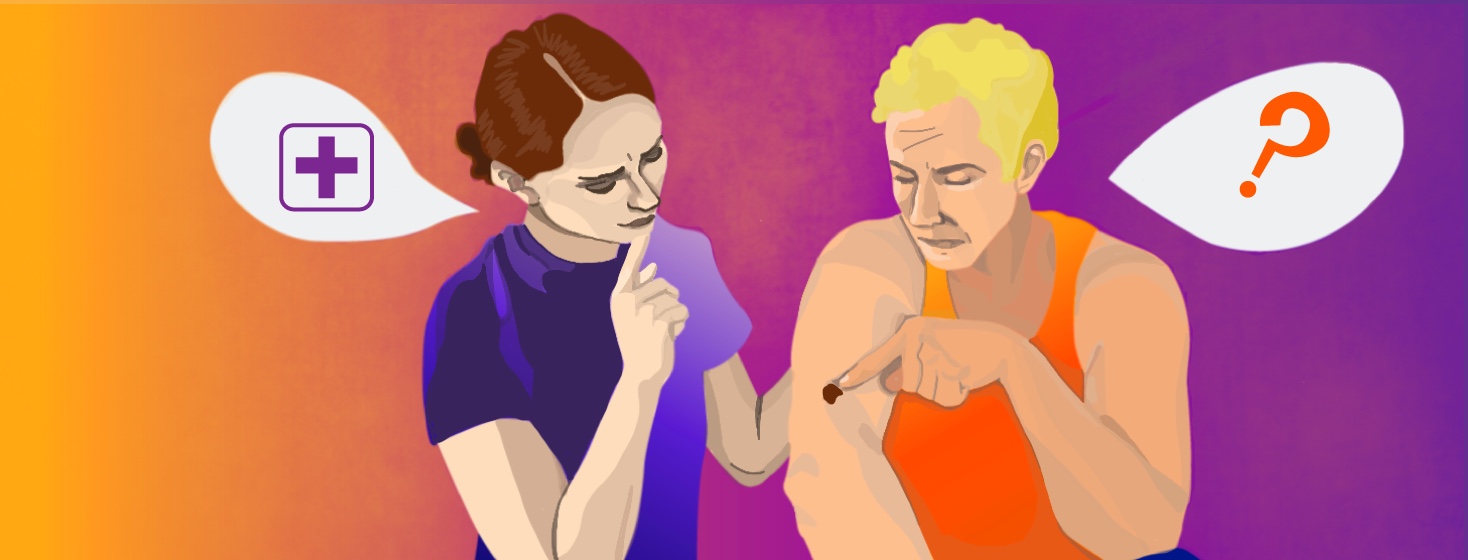Helping Others Get Screened for Skin Cancer
If you've had skin cancer, then you know how important early detection is to prevent further damage. Mine started with a place on my face that looked like a clear mole. The second time, it was a sore that would not heal. But this isn't about me, it's about helping others with early detection and encouraging them to get a skin cancer screening.
How do you broach the subject of a skin cancer screening?
If you have friends or loved ones who work in the sun, or simply have a spot that doesn't look right, how do you break the ice on skin cancer concerns? Is your intrusion warranted? And will your friends or loved ones listen to you? Here are some helpful tips on helping others get screened for skin cancer.
The power of early detection
According to the American Cancer Society, early detection and treatment of basal cell carcinoma helps ensure removal without complications. In fact, they go on to state that this includes almost all basal cell carcinomas. This is why early detection is crucial for proper treatment and removal. The best way to detect and treat cancer is by having a skin cancer screening with your dermatologist.
We may not be experts, but we can. be advocates
For obvious reasons, I'm no expert. Just because I had skin cancer in the past doesn't mean I know when someone else has it. Yet, if a friend or loved one brings to my attention an issue they're having, I certainly weigh in as best I can. And encouraging a friend of loved one to have a skin cancer screening with a dermatologist is always good advice.
There are five warning signs that you can use to help open a conversation about skin cancer
- A sore that's not healing.
These spots can present themselves in a number of ways. It may ooze, bleed, crust over, etc. But one discerning factor is that it doesn't seem to heal. - An area like a scar.
These may mean a more invasive type of basal cell carcinoma. They often appear like a shiny, flat area on the skin. These range in colors from yellow, white, and a waxy hue. - A shiny bump.
These range in colors from clear, white, red, and pink. Those with darker skin tones may see a brown, tan, or black bump. - A little pink growth.
These aren't large, but they're important too. They often have edges that are rolled or slightly raised. The indention has a crusty appearance, and some have tiny blood vessels. - An irritated area or red patch.
These are areas that may or may not hurt. They often itch or form a crust. These are usually found on the leg, arm, face, shoulder, or chest.
How to talk to a loved one about skin cancer screenings
While you cannot necessarily start off with, "I think this may be skin cancer," there are other ways to bring it up. Besides, you're not a doctor anyway. Instead of trying to diagnose someone, ask them if they have considered seeing their dermatologist for a skin cancer screening. You can bring up your experience, too. I always say something like, "I'm not a doctor, but when I had skin cancer I had a sore that wouldn't heal. It wouldn't hurt to get it looked at just to feel better."
Try to not scare them
You don't have to scare someone. Instead, casually talk about seeing someone just to get an answer. Or, mention to them about early detection. I do this casually, too. Something like, "Hey, if it is anything concerning, they take care of it fast. At least you'll know what it is. Heck, it could be something as simple as a rash or some kind of irritation." The bottom line? Suggesting a skin cancer screening is never bad advice.
Help where you can
You can't make anyone do what they don't want to. But if you see something, try to say something. At least you tried to help and your friend or loved one have peace of mind by having a skin cancer screening done.
Do you talk to your friends and loved ones about skin cancer screenings?

Join the conversation